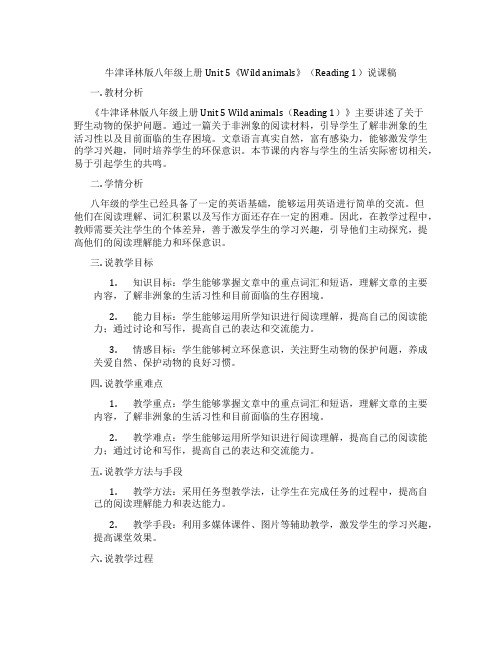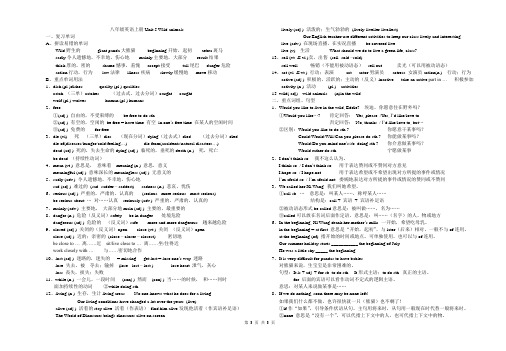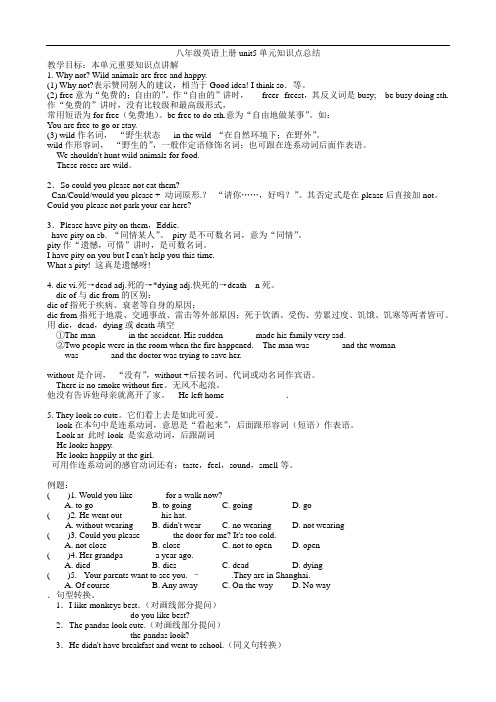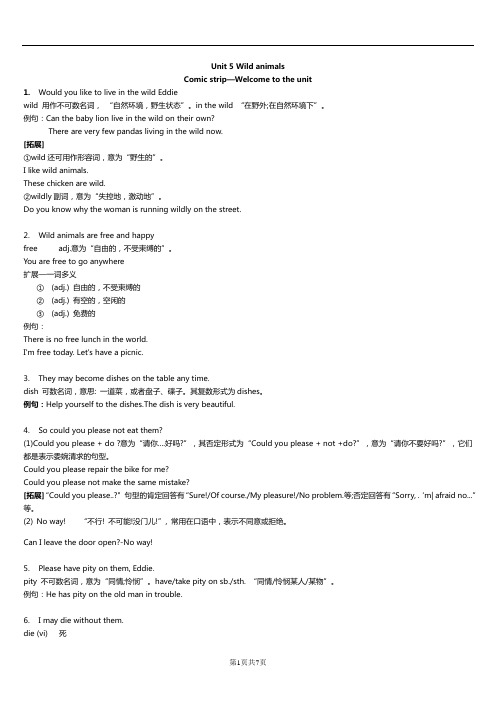[学习资料]初中八年级资料英语上册 Unit 5 Wild animals Grammar教案2 (新版)牛津版
【K12教育学习资料】八年级英语上册 Unit 5 Wild animals Comic strip

Unit 5 Wild animals【Comic strip and Welcome to the unit】Teaching aims:1.To know the names of some wild animals.2.To learn to talk about your favorite wild animals in English.Focus and difficult points:1.To know the names of some wild animals.2.To learn to talk about your favorite wild animals in English.Teaching tools : PPTTeaching procedure:Step1. Show teaching aims.(1')Step2. Understand the Welcome to the unit.Step3.Learn “Welcome to the unit”Show Guide One1. Free talkHow many wild animals do you know?Please say about them. (2')2.Finish Part A on Page57.(1')(1).Read them correctly.(1')(2).What wild animal do you like best? (2')Why do you like ...?3. Listen to the conversWild animalStep4 Understand the comicShow Guide Two1. Is Hobo a wild animal?Now let's listen to Eiddie and Hobo's dialogue and answer the questions: (1).Would Eddie like to live in the wild?Why not?2. O pen your books, please. Read the dialogue and answer the following questions.(3')(1).Will Eddie eat the wild animals?Why?3.Read the dialogue and then act it with your Partner.(5')4.Open your b ooks, listen and then read it correctly.(3')5.Work in Pairs. Use the co nversation as a model.(3')6.Understand the following sentences.(3')(1).They may become dishes on the table any time.(2).Could you pl ease not eat them?(3).I may die without them.Practice in class1.完成课课练P46一.二.三教学反思:。
牛津译林版八年级上册Unit5《Wildanimals》(Reading1)说课稿

牛津译林版八年级上册Unit 5《Wild animals》(Reading 1)说课稿一. 教材分析《牛津译林版八年级上册Unit 5 Wild animals(Reading 1)》主要讲述了关于野生动物的保护问题。
通过一篇关于非洲象的阅读材料,引导学生了解非洲象的生活习性以及目前面临的生存困境。
文章语言真实自然,富有感染力,能够激发学生的学习兴趣,同时培养学生的环保意识。
本节课的内容与学生的生活实际密切相关,易于引起学生的共鸣。
二. 学情分析八年级的学生已经具备了一定的英语基础,能够运用英语进行简单的交流。
但他们在阅读理解、词汇积累以及写作方面还存在一定的困难。
因此,在教学过程中,教师需要关注学生的个体差异,善于激发学生的学习兴趣,引导他们主动探究,提高他们的阅读理解能力和环保意识。
三. 说教学目标1.知识目标:学生能够掌握文章中的重点词汇和短语,理解文章的主要内容,了解非洲象的生活习性和目前面临的生存困境。
2.能力目标:学生能够运用所学知识进行阅读理解,提高自己的阅读能力;通过讨论和写作,提高自己的表达和交流能力。
3.情感目标:学生能够树立环保意识,关注野生动物的保护问题,养成关爱自然、保护动物的良好习惯。
四. 说教学重难点1.教学重点:学生能够掌握文章中的重点词汇和短语,理解文章的主要内容,了解非洲象的生活习性和目前面临的生存困境。
2.教学难点:学生能够运用所学知识进行阅读理解,提高自己的阅读能力;通过讨论和写作,提高自己的表达和交流能力。
五. 说教学方法与手段1.教学方法:采用任务型教学法,让学生在完成任务的过程中,提高自己的阅读理解能力和表达能力。
2.教学手段:利用多媒体课件、图片等辅助教学,激发学生的学习兴趣,提高课堂效果。
六. 说教学过程1.Pre-reading:教师通过展示一些关于野生动物的图片,引导学生谈论自己喜欢的动物,激发学生的学习兴趣。
2.While-reading:教师引导学生快速阅读文章,回答一些简单的问题,帮助学生理解文章大意。
八年级英语上册unit5 Wild animals考点复习大纲

八年级英语上册Unit 5 Wild animals一、复习单词A、拼读易错的单词Wild野生的giant panda大熊猫beginning开始,起初zebra斑马sadly令人遗憾地,不幸地,伤心地mainly主要地,大部分result结果thick厚的,密的shame憾事,羞愧accept接受tail尾巴danger危险action行动,行为law法律illness疾病slowly缓慢地move移动B、重点单词用法1、dish (pl.)dishes quality (pl.) qualitiescatch (三单)catches (过去式、过去分词)caught caughtwolf (pl.) wolves human (pl.) humans2、free①(adj.) 自由的,不受束缚的be free to do sth②(adj.) 有空的,空闲的be free = have time 有空in one’s free time 在某人的空闲时间③(adj.) 免费的for free3、die (vi) 死(三单)dies (现在分词)dying(过去式)died (过去分词)dieddie of(diseases/hunger/cold/feeling…) die from(accidents/natural disasters…)dead (adj.) 死的,失去生命的dying (adj.) 临死的,垂死的death (n.) 死,死亡be dead (持续性动词)4、mean (vt.) 意思是,意味着meaning (n.) 意思,意义meaningful (adj.) 意味深长的meaningless (adj.) 无意义的5、sadly (adv.) 令人遗憾地,不幸地,伤心地sad (adj.) 难过的(sad -sadder – saddest) sadness (n.) 悲哀,忧伤6、serious (adj.) 严重的,严肃的,认真的(serious - more serious - most serious)be serious about …对……认真seriously (adv.) 严重的,严肃的,认真的7、mainly (adv.) 主要地,大部分地main (adj.) 主要的,最重要的8、danger (n.) 危险(反义词)safety be in danger 处境危险dangerous (adj.) 危险的(反义词)safe more and more dangerous 越来越危险9、closed (adj.) 关闭的(反义词)open close (vt.) 关闭(反义词)openclose (adj.) 近的;亲密的(close – closer – closest) 密切地be close to … 离……近sit/live close to … 离……坐/住得近work closely with … 与……密切地合作10、lost (adj.) 迷路的,迷失的= missing get lost = lose one’s way 迷路lose 失去,被夺去;输掉(lose - lost – lost ) lose heart 泄气,灰心loss 丧失,损失;失败11、while (n.) 一会儿,一段时间(conj.) 然而(conj.) 当……的时候,和……同时面加持续性的动词②while doing sth.12、living (n.) 生存,生计living areas No one knows what he does for a living.Our living conditions have changed a lot over the years. (live)alive (adj.) 活着的 stay alive 活着(作表语)find him alive发现他活着(作宾语补足语)The World of Dinosaurs brings dinosaurs alive on screen.lively (adj.) 活泼的;生气勃勃的(lively-livelier-liveliest)Our English teacher use different activities to keep our class lively and interesting.live (adv.) 在现场直播,在实况直播be covered livelive (v) 生活What should we do to live a green life, class?13、sell (vt. & vi.)卖,出售(sell- sold –sold)sell well 畅销(不能用被动语态)sell out 卖光(可以用被动语态)14、act (vi. & vt.) 行动;表演act --- actor男演员--- actress 女演员action(n.) 行动;行为active (adj.) 积极的,活跃的;主动的(反义)inactive take an active part in … 积极参加activity (n.) 活动(pl.) activities15. wild( adj) wild animals (n)in the wild二、重点词组、句型1、Would you like to live in the wild, Eddie? 埃迪,你愿意住在野外吗?①Would you like…? 肯定回答:Yes, please. /Yes, I’d like/love to.否定回答:No, thanks. / I’d like/love to, but…②区别:Would you like to do sth.? 你愿意干某事吗?Could/Would/Will/Can you please do sth.?你能做某事吗?Would/Do you mind one’s/sb. doing sth.?你介意做某事吗?Would rather do sth.宁愿做某事2、I don’t think so.我不这么认为。
八年级英语上册Unt5 Wildanimals重要知识点(牛津版)

Unit5 重要知识点【welcome】1.wild 不可数名词“自然坏境,野生状态” in the wild 在野外,处于野生状态adj.“野生的” wild animals 野生动物2.free adj.自由的,不受束缚的( →freer→freest)be free/feel free to do sth随意做某事adj.免费的;空闲的→freely adv.无拘无束地;自由自在地3.dish 可数名词“一道菜”可数名词 “盘,碟” do the dishes清洗餐具4.--So could you please not eat them? --No way![ Could/Would you please (not) do sth? ] 一种表示请求的巨型,语气比较委婉、客气。
肯定回答:Sure./Of course./No problem.否定回答:Sorry,but I....[ no way ] “不可能” 常用在口语中,表示不同意或拒绝。
还可以表示不相信或惊讶 “不会吧”5.pity 不可数名词 “同情,怜悯” have /take pity on... 同情 ....可数名词 “可惜,遗憾” 常用单数形式 what a pity! 真可惜!6.die vi.死现在分词dying 过去式、过去分词dieddeath n.死亡 dead adj.死的die of...死于...(疾病,年老,劳累等内部原因)die from... 死于...(事故,地震,饥饿等外部原因)7.in fact事实上,实际上=actually(用于强调与实际情况恰恰相反)8.--What...do you like best? = What is/are your favourite...?--I like...best. =My favourite...is/are...【reading】1.mean vt.意思是,意味着过去式meant→meaning n.意义,意思→meaningful adj.有意义的→meaningless adj.无意义的●mean意为“意思是...”时,后接that引导的宾语从句。
八年级上册英语unit5 Wild animals 单元知识点总结

八年级英语上册unit5单元知识点总结教学目标:本单元重要知识点讲解1. Why not? Wild animals are free and happy.(1) Why not?表示赞同别人的建议,相当于Good idea! I think so.等。
(2) free意为“免费的;自由的”。
作“自由的”讲时,-- freer--freest,其反义词是busy; be busy doing sth. 作“免费的”讲时,没有比较级和最高级形式,常用短语为for free(免费地)。
be free to do sth.意为“自由地做某事”。
如:You are free to go or stay.(3) wild作名词,“野生状态in the wild “在自然环境下;在野外”。
wild作形容词,“野生的”,一般作定语修饰名词;也可跟在连系动词后面作表语。
We shouldn't hunt wild animals for food.These roses are wild。
2.So could you please not eat them?Can/Could/would you please + 动词原形.?“请你……,好吗?”。
其否定式是在please后直接加not。
Could you please not park your car here?3.Please have pity on them,Eddie.have pity on sb. “同情某人”。
pity是不可数名词,意为“同情”。
pity作“遗憾,可惜”讲时,是可数名词。
I have pity on you but I can't help you this time.What a pity! 这真是遗憾呀!4. die vi.死→dead adj.死的→*dying adj.快死的→death n死。
die of与die from的区别:die of指死于疾病、衰老等自身的原因;die from指死于地震、交通事故、雷击等外部原因;死于饮酒、受伤、劳累过度、饥饿、饥寒等两者皆可。
[学习资料]初中八年级资料英语上册 Unit 5 Wild animals Reading 1教案 (新版)牛津版
![[学习资料]初中八年级资料英语上册 Unit 5 Wild animals Reading 1教案 (新版)牛津版](https://img.taocdn.com/s3/m/53eab604453610661ed9f4f6.png)
Unit5 Wild animalsTeaching aims:T o understand the meaning of the report to finish the exercises prepared for you correctly.Focus and difficult po ints:To understand the meaning of the report .Teaching tools : PPTTeaching procedure:Step1. Show teaching aims. (1')Step2. Read and understand the story correctly .Show Guide One1.Read quickly the report and choose the correct answers.(4)( ) (1). What wild animal did it say in the report?A. A giant panda.B. A white mouse.C. A giant panda called Xi Wang.D. A baby panda.( ) (2).What is the main meaning of the report?A. It said that a panda called Xi Wang.B. It advised us to take action to protect the giant pandas by telling the story of Xi Wang.2. Read the first passage to the fourth passage and answer the following questions.(4')(1).How much did Xi Wang weigh when she was born?(2).What did Xi Wang start to do when she was four months old?(3).What did Xi Wang live on in the beginning?(4).When did Xi Wang learn to look after herself?3. Read the last passages and answer the following questions.(5')(1).What serious problems do giant pandas face in the wild now?(2).What actions should we take to protect giant pandas?(3).Do you believe that where there is Xi Wang, there is hope?Step3. Understand and use correctly.Show Guide Three1. Millie is making a growth chart for Xi Wang. Help her match the sentences with the pictures. Use the information in the report on page 58 to help you. Write the correct letters in the boxes.Finish Part B2 on Page 59.(5')2.Listen and find the words and phrases in Part B1.(3')Do you understand them ?Finish Part B1 on Page 59.(2')3.Read the report aloud and understand further the report in group.(6')(1). Finish the exercise(二) on Page 47(课课练)(5')Practice in classComplete Part B3, B4 on Page 60.(8') 教学反思:。
2020学年八年级上册unit 5 Wild animals 知识点详细讲解

Unit 5 Wild animalsComic strip—Welcome to the unit1.Would you like to live in the wild Eddiewild 用作不可数名词,“自然环境,野生状态”。
in the wild “在野外;在自然环境下”。
例句:Can the baby lion live in the wild on their own?There are very few pandas living in the wild now.[拓展]①wild还可用作形容词,意为“野生的”。
I like wild animals.These chicken are wild.②wildly副词,意为“失控地,激动地”。
Do you know why the woman is running wildly on the street.2.Wild animals are free and happyfree adj.意为“自由的,不受束缚的”。
You are free to go anywhere扩展—一词多义①(adj.) 自由的,不受束缚的②(adj.) 有空的,空闲的③(adj.) 免费的例句:There is no free lunch in the world.I'm free today. Let's have a picnic.3.They may become dishes on the table any time.dish 可数名词,意思: 一道菜,或者盘子、碟子。
其复数形式为dishes。
例句:Help yourself to the dishes.The dish is very beautiful.4.So could you please not eat them?(1)Could you please + do ?意为“请你....好吗?”,其否定形式为“Could you please + not +do?”,意为“请你不要好吗?”,它们都是表示委婉清求的句型。
2020学年8上Unit 5 Wild animals 知识点归纳

8上Unit 5知识点归纳重点短语:1. live in the wild 在野外生活(8A. 56)2. become dishes on the table any time随时成为桌上的美餐(8A. 56)3. have/take pity on sth. 对…产生怜悯(8A. 56)4. no way 不可能(8A. 56)5. in fact 事实上(8A. 56)6. animals in the wild 野生动物(8A. 56)7. be in danger 处于危险中(8A. 56)8. write a report on an animal in danger写一份关于危险动物的报告(8A. 56)9. do a quiz on wild animals做一个关于野生动物的测试(8A. 57)10. the king of the animal world动物世界的王者(8A. 57)11. look so cute 看上去如此可爱(8A. 57)12. call her Xi Wang 叫她希望(8A. 58)13. weigh just 100 grams 仅重100克(8A. 58)14. look like a white mouse看上去像只小白鼠(8A. 58)15. at four mouths old 在四个月大时(8A. 58)16. go outside for the first time第一次走到户外(8A. 58)17. not…any more 再也不(8A. 58)18. in the beginning = at first 起初,一开始(8A. 58)19. drink her mother’s milk 喝母亲的奶(8A. 58)20. begin to eat bamboo 开始吃竹子(8A. 58)21. learn to look after herself 学会照顾自己(8A. 58)22. face serious problems 面临严重问题(8A. 58)23. have babies 生孩子(8A. 58)24. live mainly on 主要以食…为生(8A. 58)25. bamboo forests竹林(8A. 58)26. become smaller and smaller变得越来越小(8A. 58)27. as a result 因此,结果是(8A. 58)28. have a place to live 有居住的地方(8A. 58)29. take action right away 立即采取行动(8A. 58)30. build more panda reserves建立更多的熊猫保护区(8A. 58) 31. make laws to protect pandas制定法律保护熊猫(8A. 58)32. come into the world 来到这个世上(8A. 59)33. get sick/ ill 生病(8A. 60)34. take action to protect pandas采取运动保护大熊猫(8A. 60)35. at birth 出生(8A. 60)36. go towards the water 朝水边走去(8A. 61)37. jump around 四处跳动(8A. 61)38. stand with its eyes closed 眼睛闭着站着(8A. 61)39. work out maths problems 解出数学题(8A. 62)40. fly the right way 按正确的路线飞(8A. 62)41. with the help of sb. 在某人的帮助下(8A. 62)42. get lost 迷路(8A. 62)43. come back the same way走同样的路回来(8A. 62) 44. forget where to find the food忘了到哪里去找到食物(8A. 62)45. like to live alone 喜欢单独生活(8A. 63)46. for a short while 一会儿(8A. 63)47. run for hours without stopping连续不停地奔跑数小时(8A. 63)48. work as a team 以团队形式工作(8A. 63)49. for fun 为了好玩,取乐(8A. 63)50. lose living areas 失去生活区域性(8A. 63)51. be dangerous to sb. 对某有危险期(8A. 63)52. lose one’s life失去生命,丧生(8A. 64)53. act to protect wild animals行动起来保护野生动物(8A. 64)54. a great pity一个很大的遗憾(8A. 64)55. have feelings of happiness 拥有幸福感(8A. 65)56. accept one’s invitation接受邀请(8A. 65)57. move around 四处走动(8A. 66)58. in the daytime 在白天(8A. 66)59. sleep through the winter 冬眠(8A. 66)60. catch bears for their fur and paws捕捉熊来获取它们的皮毛和爪子(8A. 67)重点句型:1. Would you like to live in the wild?你想在野外生活吗?(8A. 56)注:Would /Could you please + do sth?2. So could you please not eat wild animals?所以,请你不要吃野生动物好吗?(8A. 56)3. They may become dishes on the table any time?它们可能在任何时候都会成为餐桌上的菜肴。
- 1、下载文档前请自行甄别文档内容的完整性,平台不提供额外的编辑、内容补充、找答案等附加服务。
- 2、"仅部分预览"的文档,不可在线预览部分如存在完整性等问题,可反馈申请退款(可完整预览的文档不适用该条件!)。
- 3、如文档侵犯您的权益,请联系客服反馈,我们会尽快为您处理(人工客服工作时间:9:00-18:30)。
Unit 5 Wild animals
Learning aims:
1.To use "may" to say that something is possible correctl y.
2.To use verbs and to-infinitives together correctly.
Focus and difficult points:
1.To use "may" to say that something is possible correctly.
2.To use verbs and to-infinitives together correctly
Teaching tools : PPT
Teaching procedure:
Step1. Sho w learning aims. (1′)
【Show the learning aims. 】
Step2. Guide students to know and understand using “may” to say that something is possible correctly.
Show Guide one
1. Read and feel.(3')
(1).May I come in?
(2).May I borrow your rubber?
(3).May I smoke here?
may在此是用来表示请求许可。
表示“可以”,常用于一般疑问句。
(4).Wild animals may bec ome dishes on the table any time.
(5).I may die without them.
(6).The bamboo forests are becoming smaller and smaller. As a result, pandas may not have a place to live or food to eat.
(7).If we do nothing, soon there may be none left.
这些句子中的may 用来表示猜测某件事发生的可能性,表示“也许;可能”,多用于肯定句和否定句中。
2. Translate the sentences.(3')
(1). I may be back next year.
(2).We may have some rain today.
(3).You may not like these words-----diet and exercise.
(4).---Which school will you choose?
---I'm not sure. I may go to Nanjing Middle School.
may 译为“可能;也许” may not译为“可能不;也许不”
e may with the words in brackets to finish the exercise on P61.(6')
Keys:
(1). may need (2). may be (3). may hurt (4). may not be
(5). may be playing (6). may be sleeping
4.Try to translate them and understand using“may”to say that something is possible further .(3')
Step3.Guide students to know and understand using verbs and to-infinitives together correctly.
Show Guide Two
e the correct forms of the wo rds in brackets to complete the following
sentences.(3')
(1).He wants______(play) basketball after school.
(2).My father often ask s_____(help) him____(clean) his car.
(3).She decided____(repair) his bike instead of paying someone to do it.
(4).At 20 months old, Xi Wang learnt____(look) after herself.
动词+动词不定式,这里的动词不定式做动词的宾语。
动词不定式是指“to+动词原形”的形式,一种是带to的不定式,一种是省略to的不定式
2.Find and say "verbs and to-infinitives" togethe r.(3')
agree begin decide fail forget hope learn plan pre pare remember
try want advise make
Practice in class:
1Finish the exercise on P62.(5')
Keys:(1).learn to work out (2).decide to fly
(3).remember to come back (4).begin to save
2.Try to translate the sentences.(3')
教学反思:。
